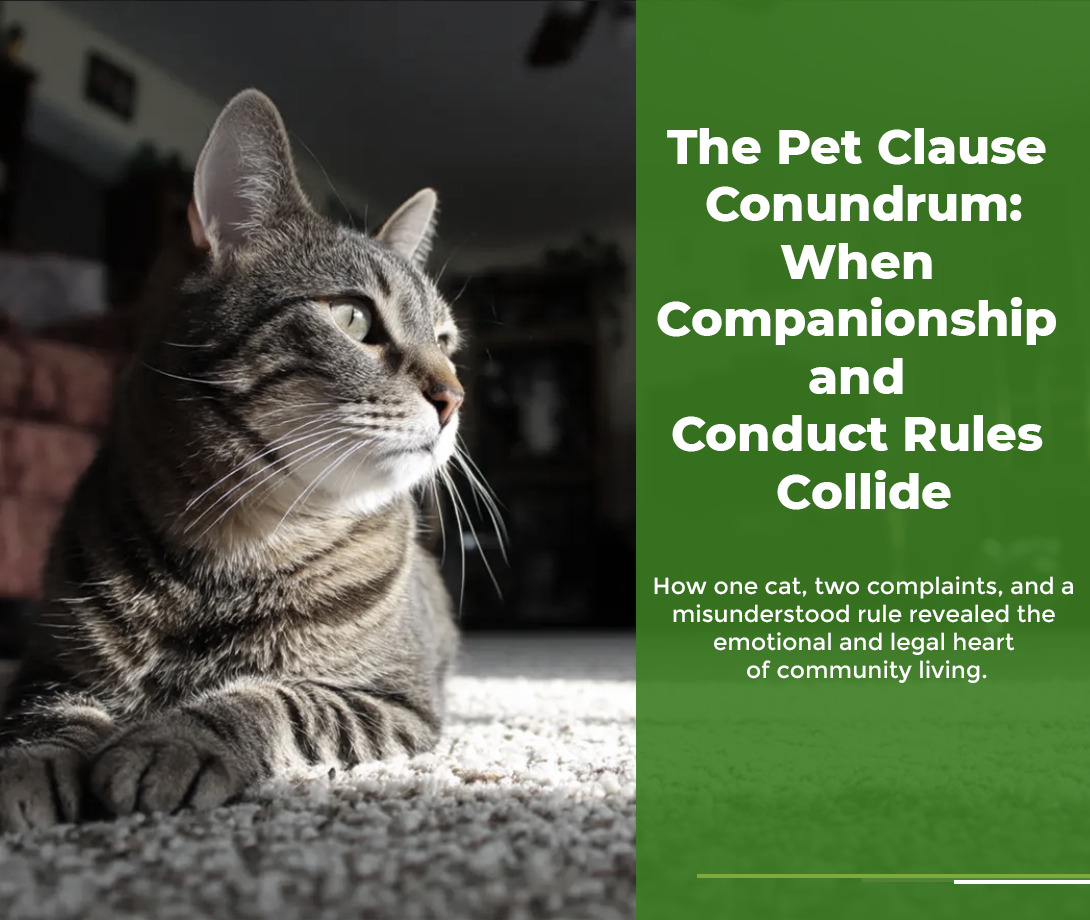How one cat, two complaints, and a misunderstood rule revealed the emotional and legal heart of community living.
(Estimated read time: 7–8 minutes)
The Story: When Paws Met Policy
It started quietly — with a cat named Milo.
In a peaceful estate outside Johannesburg, Mrs. Naidoo had just moved into her new townhouse. She loved her small indoor cat and didn’t think much about the new “No Pets Without Permission” rule. Milo was quiet, clean, and never left the house.
But three months later, a short email arrived in the trustees’ inbox:
“Unit 14 has a cat. Against the rules.”
Under pressure to enforce rules evenly, the trustees sent a formal notice:
Remove the cat within 30 days — or apply for exemption.
To Mrs. Naidoo, it felt like a personal attack.
To the trustees, it was just procedure.
Soon, emotions flared, neighbours took sides, and what began as a small misunderstanding turned into a formal Community Schemes Ombud Service (CSOS) dispute.
The cat became a case.
The case became a conversation about compassion, fairness, and what it really means to live together.
The Case: When Rules Meet Reason
Case Reference: CSOS/JHB/0791/25 (fictionalised composite)
The Complaint:
Mrs. Naidoo argued that the trustees were being unfair. They enforced the rule too strictly, without considering her situation. Milo was sterilised, microchipped, and never left the house.
The Defence:
The body corporate said all owners had voted for the rule — and that consistency was key. Allow one pet, they argued, and everyone would want one.
The Ruling:
CSOS ruled in favour of the owner.
“While trustees must enforce rules, they must also act reasonably and consider each case. A total ban on pets without flexibility can unfairly limit ownership rights.”
The Orders:
- The cat could stay, as long as it caused no noise or hygiene problems.
- The body corporate had to review its rules to ensure they were reasonable, lawful, and fairly applied, as required by Section 10(3) of the Sectional Titles Schemes Management Act (STSMA).
The Human Side: Companionship vs. Compliance
Behind this case was something deeper than a rule — it was about belonging.
For many people, especially those living alone or elderly, pets are not property — they’re family. Losing them can feel like losing part of your home.
But trustees face their own challenge: keeping rules fair for everyone.
If they make one exception, where do they stop? What happens when “a small, quiet cat” becomes “two barking dogs next door”?
This is the fairness dilemma — where one side sees fairness as equal treatment for all, and the other sees it as fair treatment for each.
Both sides have a point. But without open talk, fairness can quickly feel like unfairness.
“Rules should be anchors, not weapons,” said one managing agent who testified in the case. “They’re meant to protect harmony, not punish difference.”
Lessons from the CSOS Ruling
| Lesson | What It Means |
| 1. Reasonableness is the Golden Rule | Even valid rules must be applied with fairness and context. |
| 2. Blanket Bans Breed Backlash | “No pets” rules rarely stand up if they’re too rigid or outdated. |
| 3. Communication Prevents Conflict | A simple conversation early on can stop problems from growing. |
| 4. Documentation Matters | Keep clear records of complaints, approvals, and meetings — it protects everyone. |
Sidebar: The Bigger Picture — Pets and People in Numbers
| Statistic | Insight |
| 22% | Of all CSOS behaviour disputes in 2024 involved pets — up from 15% in 2021. |
| 68% | Of complexes have unclear or outdated pet rules. (CSOS Annual Report 2024) |
| 80% | Of rulings favour conditional approval rather than total bans. |
| R 35,000 | Average legal + CSOS cost per long-running pet dispute. |
Trend Insight:
As cities grow and living spaces shrink, pets are no longer rare — they’re part of modern community life. Rules written in 2015 don’t fit the realities of 2025.
What This Means for You
For Trustees
- Avoid blanket bans — create conditional approval frameworks instead.
- Focus on behaviour, not species.
- Allow compassionate exemptions for therapy or elderly owners.
For Residents
- Always disclose pets when buying or renting.
- Remember: approval is not immunity — if your pet causes nuisance, permission can be revoked.
- Be considerate. Courtesy often earns leniency.
For Managing Agents
- Help trustees balance enforcement with empathy.
- Make sure rule updates are properly registered and communicated to everyone.
Final Reflection: The Law of Love and Limits
At its heart, the Pet Clause Conundrum isn’t really about cats — it’s about community.
We share walls, gardens, and hallways. But we also share emotions, empathy, and the quiet joy of everyday life.
Pets remind us that harmony isn’t built on silence — it’s built on understanding.
As one CSOS adjudicator wisely noted:
“Regulation without reason is tyranny in miniature.”
Balancing rules with compassion is hard work — but it’s what transforms a row of houses into a true community.
CSOS Digest Takeaway
| Principle | Description |
| Transparency | Keep rules public and update them yearly. |
| Governance | Align conduct rules with STSMA and fairness tests. |
| Empathy | See the person behind the pet. |
| Dialogue | A good conversation can save a courtroom battle. |


